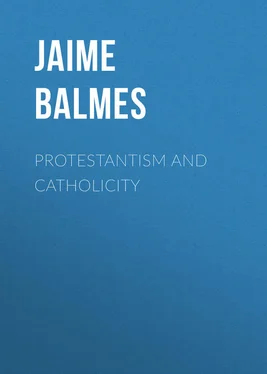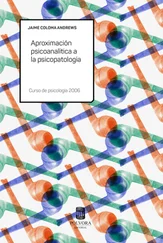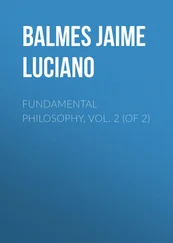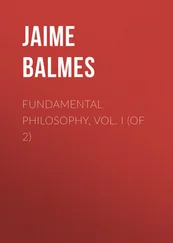Jaime Balmes - Protestantism and Catholicity
Здесь есть возможность читать онлайн «Jaime Balmes - Protestantism and Catholicity» — ознакомительный отрывок электронной книги совершенно бесплатно, а после прочтения отрывка купить полную версию. В некоторых случаях можно слушать аудио, скачать через торрент в формате fb2 и присутствует краткое содержание. Жанр: foreign_antique, foreign_prose, на английском языке. Описание произведения, (предисловие) а так же отзывы посетителей доступны на портале библиотеки ЛибКат.
- Название:Protestantism and Catholicity
- Автор:
- Жанр:
- Год:неизвестен
- ISBN:нет данных
- Рейтинг книги:3 / 5. Голосов: 1
-
Избранное:Добавить в избранное
- Отзывы:
-
Ваша оценка:
- 60
- 1
- 2
- 3
- 4
- 5
Protestantism and Catholicity: краткое содержание, описание и аннотация
Предлагаем к чтению аннотацию, описание, краткое содержание или предисловие (зависит от того, что написал сам автор книги «Protestantism and Catholicity»). Если вы не нашли необходимую информацию о книге — напишите в комментариях, мы постараемся отыскать её.
Protestantism and Catholicity — читать онлайн ознакомительный отрывок
Ниже представлен текст книги, разбитый по страницам. Система сохранения места последней прочитанной страницы, позволяет с удобством читать онлайн бесплатно книгу «Protestantism and Catholicity», без необходимости каждый раз заново искать на чём Вы остановились. Поставьте закладку, и сможете в любой момент перейти на страницу, на которой закончили чтение.
Интервал:
Закладка:
But it may be easily understood that Protestantism, on account of its essentially dissolving nature, is incapable of producing any thing in morals or religion to increase the happiness of nations, for it is impossible for this happiness to exist as long as men's minds are at war on the most important questions which can occupy them.
When the observer, amid this chaos and obscurity, seeks for a ray of light to illuminate the world – for a powerful principle capable of putting an end to so much confusion and anarchy, and of bringing back men's minds to the path of truth, Catholicity immediately presents herself to him, as the only source of all these benefits. When we consider with what éclat and with what power Catholicity maintains herself against all the unprecedented attempts which are made to destroy her, our hearts are filled with hope and consolation; and we feel inclined to hail this divine religion, and to congratulate her on the new triumph which she is about to achieve on earth.
There was a time when Europe, inundated by a torrent of barbarians, saw at once overwhelmed all the monuments of ancient civilization and refinement. Legislators and their laws, the empire and its power and splendor, philosophers and the sciences, the arts and their chef-d'œuvres , all disappeared; and those immense regions, where had flourished all the civilization and refinement that had been gained during so many ages, were suddenly plunged into ignorance and barbarism. Nevertheless, the spark of light which had appeared to the world in Palestine, continued to shine amid the chaos: in vain did whirlwinds threaten to extinguish it; kept alive by the breath of the Eternal, it continued to shine. Ages rolled away, and it appeared with greater brilliancy; and when, perchance, the nations only expected a beam of light to guide them in the darkness, they found a resplendent sun, everywhere diffusing life and light: and who shall say that there is not reserved for her in the secrets of the Eternal, another triumph more difficult, but not less useful, not less brilliant? If in other times that religion instructed ignorance, civilized barbarism, polished rudeness, softened ferocity, and preserved society from being always the prey of the fiercest brutality and the most degrading stupidity, will it be less glorious for her to correct ideas, to harmonize and refine feelings, to establish the eternal principles of society, to curb the passions, to remove animosities, to remove excesses, to govern all minds and hearts? How honorable will it be to her, if, while regulating all things, and unceasingly stimulating all kinds of knowledge and improvement, she can inspire with a proper spirit of moderation that society which so many elements, devoid of central attraction, threaten every moment with dissolution and death!
It is not given to man to penetrate the future; but in the same way as the physical world would be broken up by a terrible catastrophe, if it were deprived for a moment of the fundamental principle which gives unity, order, and concert to the various movements of the system; in the same way, if society, full as it is of motion, of communication, and life, were not placed under the direction of a constant and universal regulating principle, we could not fix our eyes on the lot of future generations without the greatest alarm.
There is, however, a fact which is consoling in the highest degree, viz. the wonderful progress which Catholicity has made in different countries. It is gaining strength in France and Belgium: the obstinacy with which it is combated in the north of Europe shows how much it is feared. In England its progress has been recently so great that it would not be credited without the most irresistible evidence; and in the foreign missions it has shown an extent of enterprise and fruitfulness, worthy of the time of its greatest ascendency and power.
When other nations tend towards unity, shall we commit the gross mistake of adopting schism? at a time when other nations would be happy to find within their bosoms a vital principle capable of restoring the power which incredulity has destroyed, shall Spain, which preserves Catholicity, and alone possesses it full and complete, allow the germ of death to be introduced into her bosom, thereby rendering impossible the cure of her evils, or rather entailing on herself complete and certain ruin? Amid the moral regeneration towards which nations are advancing, seeking to quit the painful position in which they have been placed by irreligious doctrines, is it possible to overlook the immense advantage which Spain still preserves over most of them? Spain is one of those least affected by the gangrene of irreligion; she still preserves religious unity, that inestimable inheritance of a long line of ages. Is it possible to overlook the advantage of that unity if properly made use of, that unity which is mixed up with all our glories, which awakens such noble recollections, and which may be made so wonderful an instrument in the regeneration of social order?
If I am asked my opinion of the nearness of the danger, and if I think the present attempts of Protestants have any probability of success, I must draw a distinction in my reply. Protestantism is extremely weak, both on account of its own nature, and of its age and decaying condition. In endeavoring to introduce itself into Spain, it will have to contend with an adversary full of life and strength, and deeply rooted in the soil. This is the reason why I think that its direct action is not to be feared; and yet, if it should succeed in establishing itself in any part of our country, however limited may be its domain, it is sure to produce fearful results. It is evident that we shall then have in the midst of us a new apple of discord, and it is not difficult to foresee that collisions will frequently arise. Protestantism in Spain, besides its intrinsic weakness, will labor under the disadvantage of not finding its natural aliment. Hence it will be obliged to take advantage of any support that is offered; it will immediately become the point of reunion for the discontented; and although failing in its intended object, it will succeed in becoming the nucleus of new parties and the banner of factions. Scandal, strife, demoralization, troubles, and perhaps catastrophes, – such will be the immediate and infallible results of the introduction of Protestantism among us. On this point I appeal to the candid opinion of every man who is well acquainted with Spain. But this is not all: the question is enlarged, and acquires an incalculable importance, if we consider it with reference to foreign politics. What a lever will be afforded to foreigners for all kinds of attempts in our unhappy country! How gladly will those, who are perhaps on the look-out for such an aid, avail themselves of it!
There is in Europe a nation remarkable for her immense power, and worthy of respect on account of the great progress which she has made in the arts and sciences; a nation that holds in her hands powerful means of action in all parts of the world, and knows how to use them with wonderful discretion and sagacity. As that nation has taken the lead in modern times in passing through all the phases of political and religious revolution, and has seen, during fearful convulsions, the passions in all their nakedness, and crime in all its forms, she is better acquainted than all others with their causes.
Not misled by the vain names under which, at such periods, the lowest passions and the most sordid interests disguise themselves, she is too much on her guard to allow the troubles which have inundated other countries with tears and blood, to be easily excited within herself. Her internal peace is not disturbed by the agitation and heat of disputes; although she may expect to have to encounter, sooner or later, difficulties and embarrassments, she enjoys, in the mean time, the tranquillity which is secured to her by her constitution, her manners, her riches, – and, above all, by the ocean which surrounds her. Placed in so advantageous a position, that nation watches the progress of others, for the purpose of attaching them to her car by golden chains, if they are simple enough to listen to her flattery; at least she attempts to hinder their advance, when a noble independence is about to free them from her influence. Always attentive to her own aggrandizement, by means of commerce and the arts, and by a policy eminently mercantile, she hides her self-interest under all sorts of disguises; and although religion and politics, where she has to do with another people, are quite indifferent to her, she knows how to make an adroit use of these powerful arms, to make friends, to defeat her enemies, and to enclose all within the net of commerce, which she is always extending in all quarters of the world. Her sagacity must necessarily have perceived how much progress she will have made in adding Spain to the number of her colonies, when she has persuaded the Spanish people to fraternize with her in religion; not so much on account of the sympathy which such a fraternization would establish between them, as because she would find therein a sure method of stripping the Spanish people of that peculiar character and grave appearance which distinguishes them from all others, by depriving them of the only national and regenerative idea which remains to them after so many convulsions; from that moment, in truth, Spain, that proud nation, would be rendered accessible to all kinds of foreign impressions, docile and pliable in bending to all opinions, and subject to the interests of her astute protectors. Let it not be forgotten that there is no other nation that conceives her plans with so much foresight, prepares them with so much prudence, executes them with so much ability and perseverance. As she has remained since her great revolutions, that is, since the end of the seventeenth century, in a settled condition, and entirely free from the convulsions undergone since that time by other European nations, she has been able to follow a regular political system, both internal and external; and her politicians have been formed to the perfect science of government, by constantly inheriting the experience and views of their predecessors. Her statesmen well know how important it is to be prepared beforehand for every event. They deeply study what may aid or impede them in other nations. They go out of the sphere of politics: they penetrate to the heart of every nation over which they propose to extend their influence: they examine what are the conditions of its existence; what is its vital principle; what are the causes of the strength and energy of every people.
Читать дальшеИнтервал:
Закладка:
Похожие книги на «Protestantism and Catholicity»
Представляем Вашему вниманию похожие книги на «Protestantism and Catholicity» списком для выбора. Мы отобрали схожую по названию и смыслу литературу в надежде предоставить читателям больше вариантов отыскать новые, интересные, ещё непрочитанные произведения.
Обсуждение, отзывы о книге «Protestantism and Catholicity» и просто собственные мнения читателей. Оставьте ваши комментарии, напишите, что Вы думаете о произведении, его смысле или главных героях. Укажите что конкретно понравилось, а что нет, и почему Вы так считаете.












